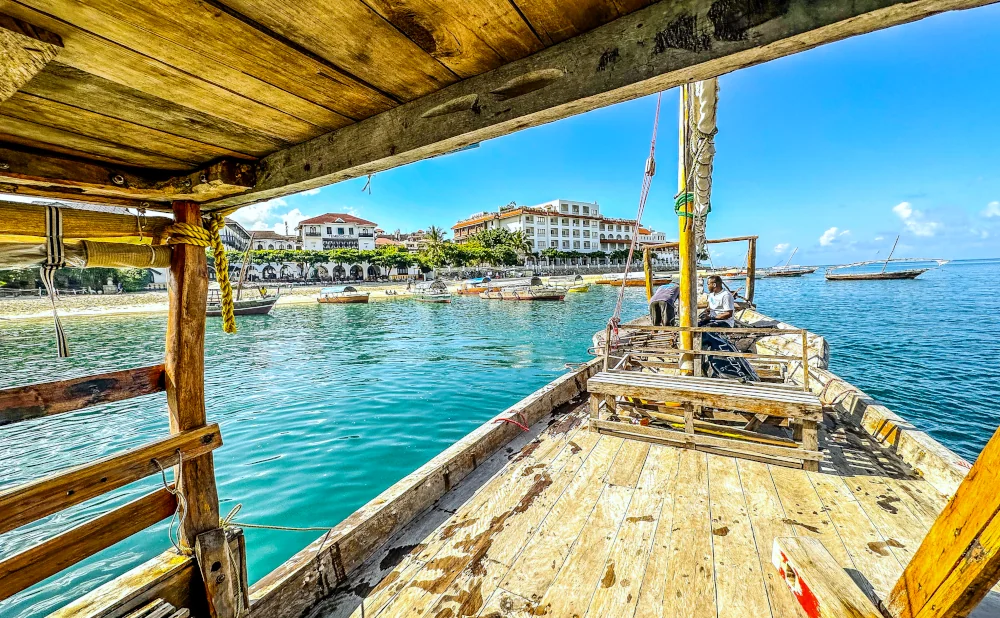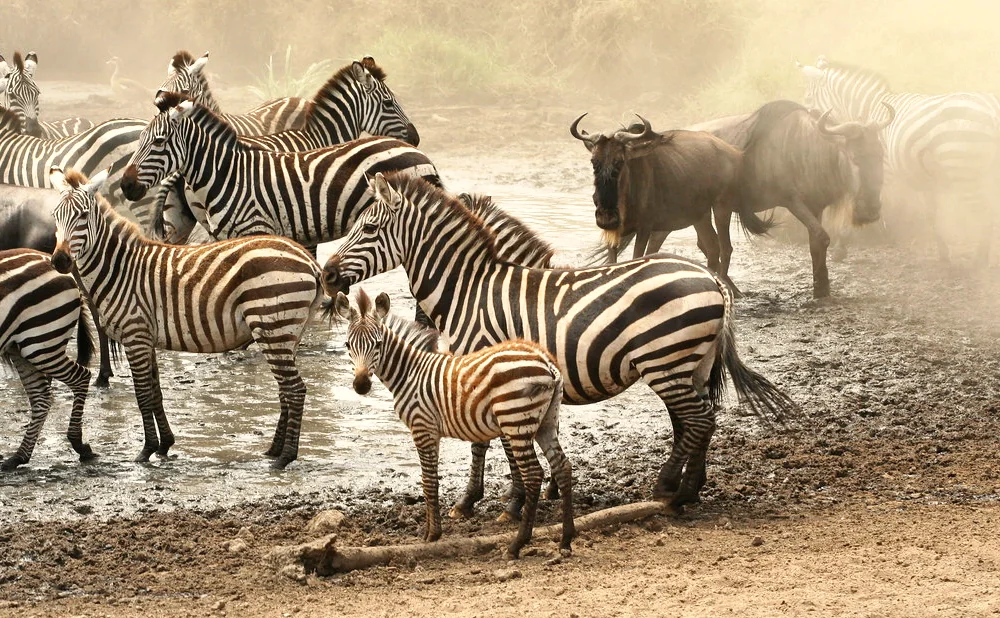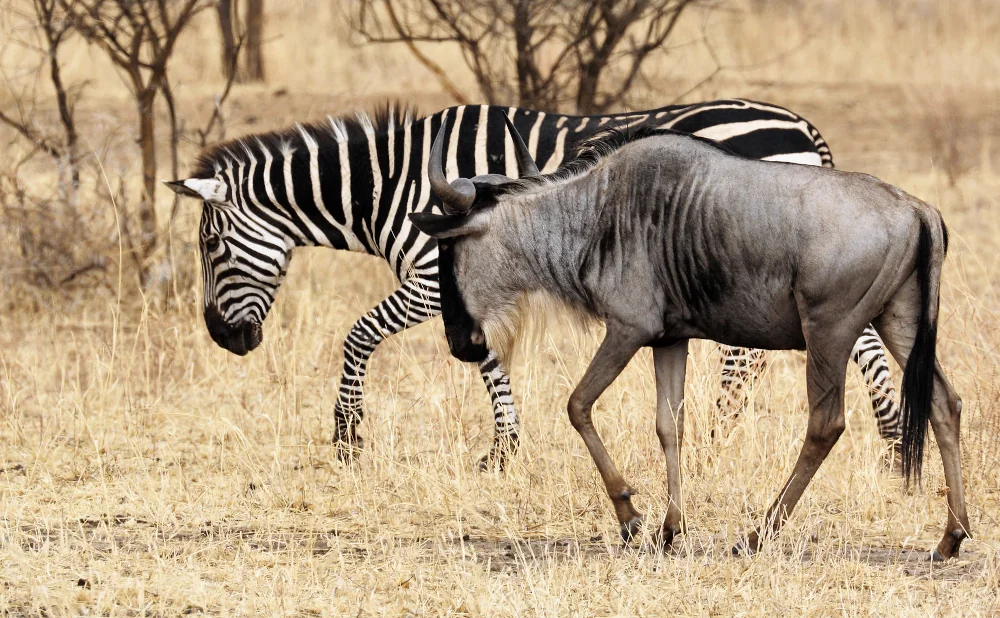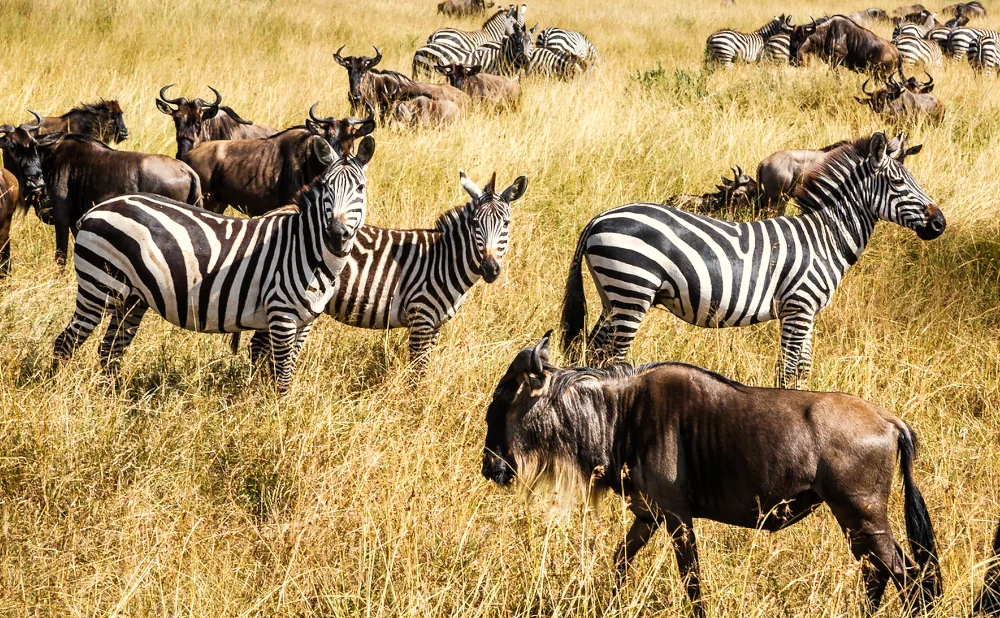Ruaha National Park

Ruaha National Park, located in central Tanzania, is known for its dramatic landscapes and rich wildlife.
- Size: Ruaha National Park covers approximately 20,226 square kilometers (7,809 square miles), making it one of Tanzania’s largest national parks.
-Location: Situated in central Tanzania, Ruaha lies in the heart of the country’s southern circuit.
- Established: The park was officially established in 1964.
- Elephants: Ruaha is home to one of the largest populations of African elephants in Tanzania.
- Lions: The park has a significant population of lions, often seen in prides during game drives.
- Leopards: Leopards are present in Ruaha, though they are more elusive and harder to spot.
- African Wild Dogs: The park supports one of the largest populations of African wild dogs in Tanzania.
- Buffaloes: Large herds of African buffalo roam the park’s vast plains.
- Giraffes: Ruaha features both Masai and reticulated giraffes.
- Zebras: Zebra herds are commonly seen grazing in the park’s savannahs.
- Wildebeests: Wildebeests are part of the park’s diverse ungulate population.
- Hippos: Hippos are found in the park’s rivers and waterholes, including the Great Ruaha River.
- Nile Crocodiles: Nile crocodiles inhabit the park’s rivers and wetlands.
- Antelopes: Various antelope species, including greater kudu, eland, and sable antelope, are present.
- Greater Kudu: The park is known for its healthy population of greater kudu, notable for their impressive horns.
- Sable Antelope: Ruaha is one of the best places to see sable antelopes, which are relatively rare.
- Spotted Hyenas: Spotted hyenas are commonly seen and play a key role in the park’s ecosystem.
- Bird Species: Over 570 bird species have been recorded in Ruaha, making it a prime destination for birdwatchers.
- Raptors: The park hosts a variety of raptors, including eagles and vultures.
- Marabou Storks: Large numbers of marabou storks are found in the park’s wetlands.
- **Scenic Landscapes: The park features diverse landscapes, including savannahs, miombo woodlands, and rugged hills.
- Great Ruaha River: The river is a key feature of the park, providing water and attracting wildlife.
- Mwagusi River: Another important water source in the park, supporting both wildlife and vegetation.
- Baobab Trees: Iconic baobab trees are scattered throughout the park, adding to its unique scenery.
- Walking Safaris: Ruaha offers walking safaris, allowing visitors to explore the park’s landscapes on foot.
- Guided Game Drives: Game drives are a popular way to view the park’s diverse wildlife.
- Night Safaris: Some operators offer night safaris for a chance to see nocturnal animals.
- Climate: Ruaha has a tropical savanna climate with distinct wet and dry seasons.
- Wet Season: The wet season runs from November to April, bringing lush vegetation and seasonal flooding.
- Dry Season: The dry season, from May to October, is ideal for wildlife viewing as animals concentrate around water sources.
- Visitor Facilities: The park has lodges and campsites that provide accommodations and basic amenities.
- Park Rangers: Experienced rangers lead safaris and ensure visitor safety.
- Conservation Efforts: Ruaha is involved in various conservation projects aimed at protecting its wildlife and habitats.
- Scientific Research: The park supports research and monitoring of wildlife populations and ecosystems.
- Photography: The park’s landscapes and wildlife offer excellent opportunities for photography.
- Community Projects: Ruaha supports community-based tourism projects that benefit local populations.
- Vegetation: The park features a mix of miombo woodlands, open savannahs, and riverine forests.
- Seasonal Wildlife Movements: Wildlife patterns and visibility change with the seasons, providing varied viewing experiences.
- Remote Experience: The park’s relatively remote location offers a more secluded safari experience.
- Local Wildlife Experts:Guides and local experts provide valuable insights into the park’s wildlife and ecosystems.
- Eco-Tourism: Ruaha emphasizes sustainable tourism practices and eco-friendly initiatives.
- Park Management: Managed by the Tanzania National Parks Authority (TANAPA) to ensure conservation and visitor satisfaction.
- Educational Centers: Visitor centers offer information and educational exhibits about the park’s natural and cultural heritage.
- Cultural Interaction: Visitors can learn about local cultures and traditions through community-based tours.
- Baobab Forests: The park features dense baobab forests that are unique to the region.
- Wildlife Monitoring The park is involved in ongoing monitoring and research to track wildlife health and populations.
- **Migration Patterns:** Ruaha is part of a broader ecosystem that includes seasonal migrations of various species.
- **Diverse Ecosystems:** The park’s varied ecosystems support a rich array of flora and fauna.
- Tourist Access: Ruaha is accessible via several airstrips and has connections to major Tanzanian cities.
- Adventure Activities: In addition to traditional safaris, the park offers opportunities for adventure activities such as hiking and birdwatching.
- Photographic Safaris: The park’s diverse wildlife and landscapes make it a great destination for photographic safaris.
- Seasonal Floodplains: The park’s floodplains attract large numbers of wildlife during the wet season.
- Conservation Education: The park offers programs and activities focused on raising awareness about conservation and wildlife protection.
- Game Viewing: The park’s extensive road network allows for excellent game viewing and exploration.
- Water Sources: Major rivers and wetlands in the park are crucial for sustaining wildlife populations, particularly during dry periods.
- Environmental Impact: The park is a vital component of Tanzania’s southern conservation landscape, contributing to regional ecological networks.
- Guided Tours: Experienced guides provide insights into the park’s wildlife and ensure a safe and enjoyable experience for visitors.
- Tanzania’s Southern Circuit: Ruaha is a key part of Tanzania’s southern safari circuit, offering diverse and rich wildlife experiences.










